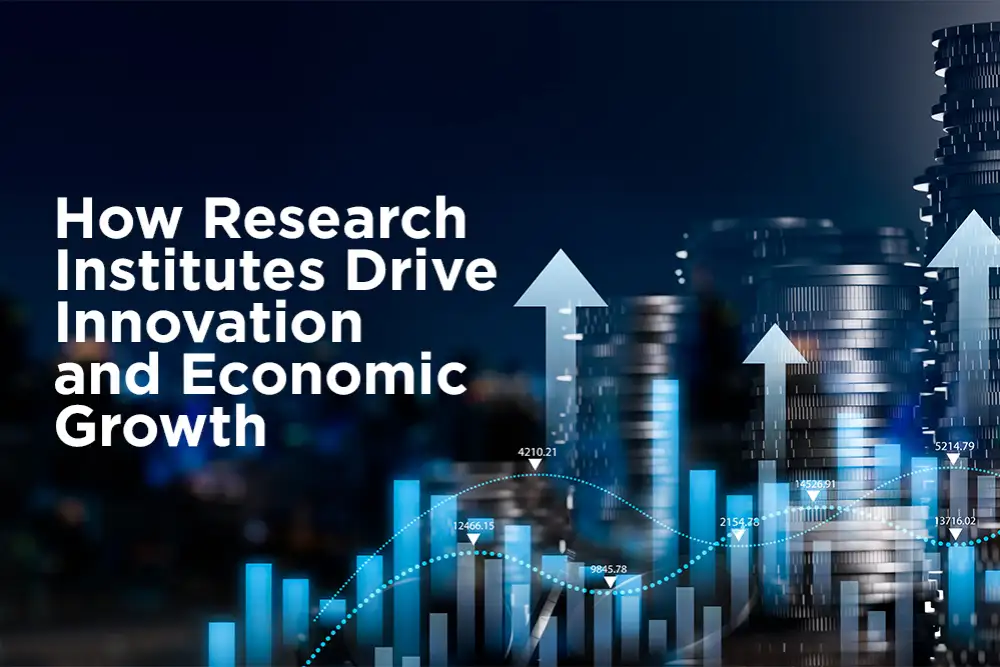How Research Institutes Drive Innovation and Economic Growth

Research institutes play a pivotal role in economic growth and development that often goes underappreciated. Their contribution isn't just about creating new knowledge or pushing the boundaries of what we understand; it's about fundamentally shaping the future of our economies and societies. Hence, the role of research institutes in economic development cannot be overstated.
They are the engines of innovation, driving advances that fuel economic growth, create jobs, and solve societal challenges. This blog aims to demystify how these institutions work behind the scenes to propel us forward.
The Heartbeat of Innovation
Research institutes are the breeding grounds for innovation. They're where curious minds delve into uncharted territories, ask questions that have yet to be asked, and find solutions to problems we didn't know we had. This relentless pursuit of knowledge leads to discoveries and technologies that form the basis of new industries, products, and services.
Consider the internet, GPS, and renewable energy technologies—all stemmed from research that began in academic and government labs.
Bridging Theory and Practice
One of the unique aspects of research institutes is their ability to bridge theoretical knowledge with practical application. They're not just about pondering the big questions in science and engineering but also about applying those insights in ways that impact the real world.
This bridge between theory and practice is where innovation thrives, leading to the development of new technologies and processes that drive economic growth.
Collaboration: The Key to Unlocking Potential
Research institutes often serve as a nexus for collaboration among academia, industry, and government. This collaboration is crucial for innovation. It brings together diverse perspectives, expertise, and resources, facilitating knowledge transfer from research labs to the marketplace. Such partnerships ensure that research findings are translated into practical, marketable innovations that spur economic development.
Economic Growth: Beyond the Lab
The impact of research institutes extends far beyond the confines of their laboratories and academic papers. They are vital cogs in the economic machinery, contributing to economic growth in several ways.
Spurring Industrial Innovation
Industries across the board benefit from the discoveries and technologies developed in research institutes. From biotechnology and pharmaceuticals to information technology and renewable energy, the foundational work of these institutes leads to the development of new products, services, and even entirely new industries. This boosts economic productivity and creates high-skilled jobs, further stimulating economic growth.
Attracting Investment
Innovative breakthroughs act as magnets for investment. Venture capitalists, corporations, and governments are keen to invest in cutting-edge technologies and startups that emerge from research institutes. This influx of investment creates a virtuous cycle, fueling further research, innovation, and economic growth.
Additionally, the presence of research institutions often attracts companies to set up nearby, looking to tap into the talent and innovation ecosystem, further enhancing regional economic development.
Enhancing Human Capital
Research institutes are crucial in education and training, developing the human capital necessary for a knowledge-based economy. They provide a setting where students and researchers can work on real-world problems, equipping them with valuable skills and experience.
This not only enhances the employability of graduates but also ensures a steady supply of skilled professionals who can drive innovation and economic growth.
Addressing Societal Challenges
Research institutes' work often leads to solutions for some of the most pressing societal challenges, from healthcare and disease prevention to environmental sustainability and food security. By addressing these challenges, research institutes improve the quality of life and open up new markets and opportunities for economic growth.
The Road Ahead
The role of research institutes in economic development is dynamic and evolving. As we face new global challenges and opportunities, the importance of these institutions in driving innovation and economic growth only increases.
To maximize their impact, sustained investment in research and development, policies that encourage collaboration and knowledge transfer, and an ecosystem that supports innovation and entrepreneurship must be made.
Embracing Future Technologies
Research institutes are at the forefront of exploring future technologies, such as artificial intelligence, biotechnology, and new energy sources. Their work in these areas promises to revolutionize industries and drive the next wave of economic growth. Embracing and investing in these technologies will be key to sustaining long-term economic development.
Global Collaboration
In an increasingly interconnected world, the challenges we face are global. Research institutes have a vital role to play in fostering international collaboration, sharing knowledge, and working together on global challenges. Such collaboration can accelerate innovation and magnify its impact on economic growth.
Conclusion
The role of research institutes in economic development is profound and multifaceted. They are not just ivory towers of academic pursuit but vibrant hubs of innovation that drive economic growth, create jobs, and solve real-world problems. Their work bridging theory and practice, fostering collaboration, and pushing the frontiers of knowledge is indispensable for creating a prosperous and sustainable future.
As we look ahead, supporting and investing in these institutions will be crucial for harnessing the power of innovation to fuel economic growth and improve the quality of life worldwide.
The importance of research institutes in the economic ecosystem must be considered. They are essential for nurturing innovation, driving industrial growth, attracting investment, and developing the skilled workforce needed for the future. As we navigate the complexities of the 21st century, the role of research institutes in fostering economic development and addressing societal challenges will only become more vital.
